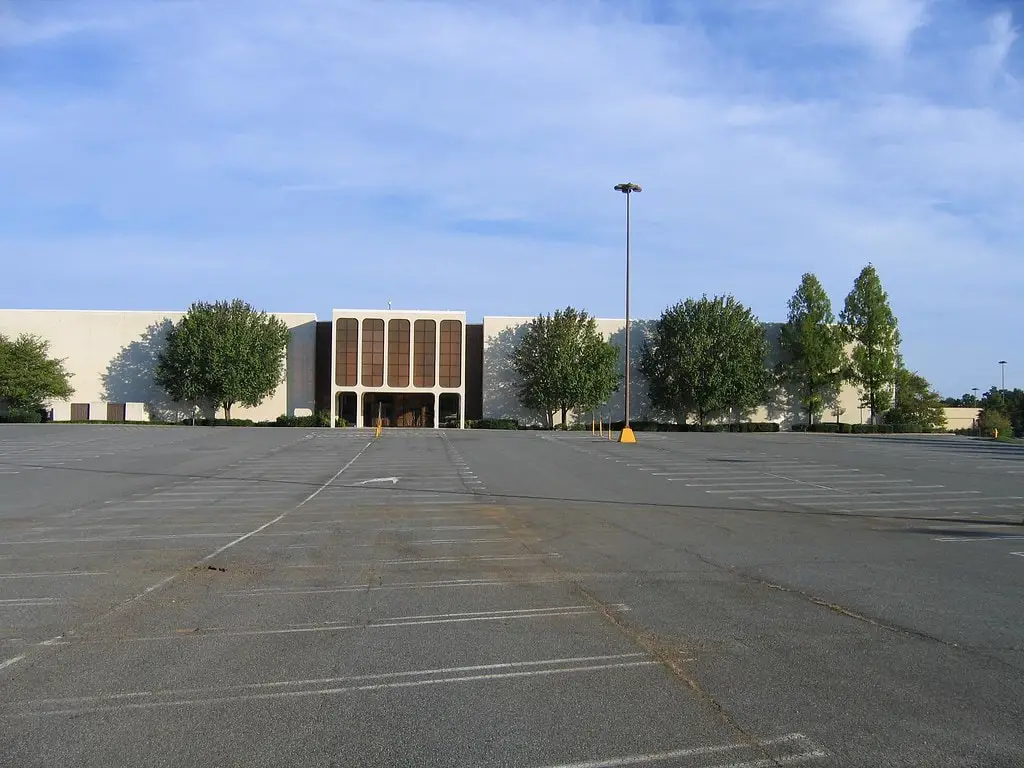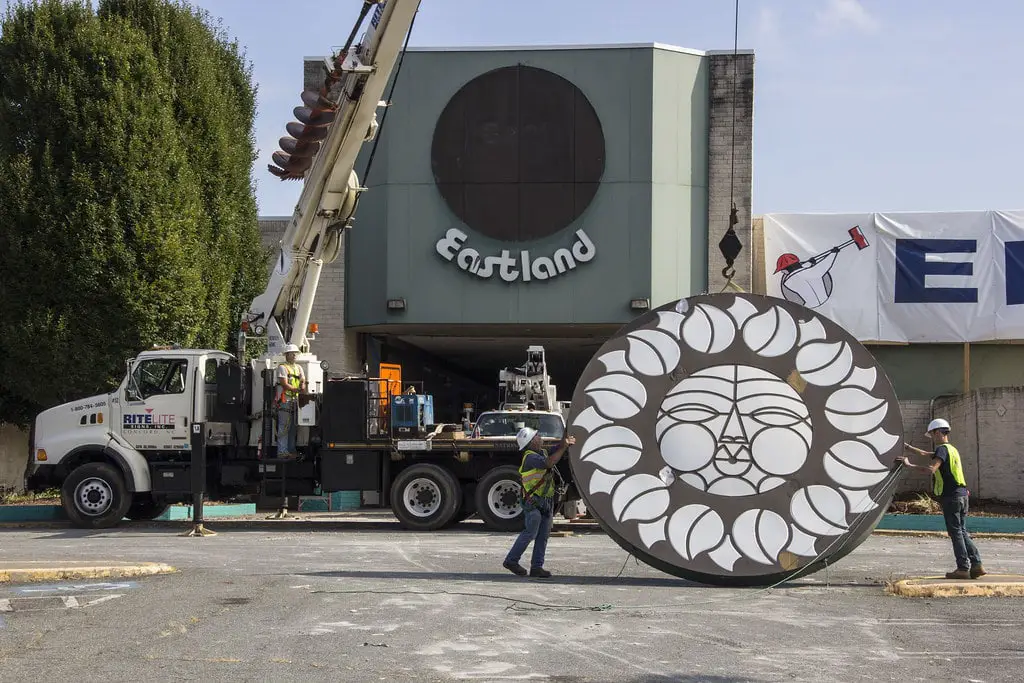The Rise of Eastland Mall
Once a bustling retail hub, Eastland Mall marked its grand opening in Charlotte, North Carolina, on July 30, 1975. Developed by Faison Enterprises, this shopping center was heralded as the largest mall in the state at the time.
Its doors revealed a modern consumer paradise featuring three major department stores: Belk, J.C. Penney, and Ivey’s, the main attractions drawing in crowds from all over the region.
The mall was not just a place for shopping; it was a center for community and entertainment. One of its most notable features was North Carolina’s first food court.
This concept was revolutionary at the time. This wasn’t just any food court; it was the first of its kind on the East Coast, setting a trend that would become a staple in malls across America.
Additionally, Eastland Mall boasted an ice skating rink, providing a unique recreational activity that complemented the shopping experience and made it a go-to destination for families looking for things to do in Charlotte, North Carolina.
During its early years, Eastland Mall was more than just a shopping center; it symbolized growth and prosperity in East Charlotte.
The mall’s success was mirrored by its thriving businesses, including a Harris Teeter grocery store and a specialty store by Miller & Rhoads. However, the latter closed its doors in 1986.
The mall’s design and amenities reflected the era’s optimism and the community’s desire for a modern, all-inclusive retail experience.
The mall continued to evolve as the years progressed, with Ivey’s transforming into Dillard’s in the early 1990s.
This move expanded the store and updated the mall’s interior, keeping the shopping experience fresh and exciting for visitors.
Decline of a Retail Giant
The decline of Eastland Mall began in the late 1990s, a period marked by significant changes in the retail industry and the surrounding community.
The once-thriving mall started to lose appeal due to factors, including demographic shifts in east Charlotte and increased crime rates around the area.
USA Quiz
How many questions would you like?
These changes impacted the shopping behavior of the local population, leading to a decrease in foot traffic and sales.
Retail shifts played a crucial role in the mall’s downturn. 2002, JCPenney left Eastland, a significant loss since it was one of the original anchor stores. This departure was a sign of the times, as other retailers began re-evaluating their presence in the mall.

By 2004, the space vacated by JCPenney was divided, with Burlington Coat Factory taking the upper level, while the lower space was split between Fred’s discount store and a Prime Time store.
The exodus continued with Dillard’s downsizing in 2005, operating only a clearance center on one level.
The mall’s physical condition also contributed to its decline. As stores left and customer visits dwindled, the maintenance and updating of the mall lagged.
This neglect led to a further decrease in attractiveness to both shoppers and potential new retailers. The surrounding area’s changing demographics and the mall’s deteriorating condition created a cycle of decline that proved difficult to reverse.
By the late 2000s, Eastland Mall had become a shadow of its former self, with empty storefronts and a dwindling number of visitors.
The Final Days and Closure
The final chapter in Eastland Mall’s history began in the late 2000s, leading to its closure in 2010. The mall’s struggles culminated when the city of Charlotte decided to step in, purchasing the property from Boxer Properties and the owners of the vacant anchor spaces.
This acquisition was part of a broader strategy to control the site’s future development and prevent further decline in the surrounding area.
Despite the city’s involvement, the mall’s fate was sealed. In May 2013, the Charlotte City Council voted 10-1 to demolish the mall, a decision driven by the need for more interest from potential developers in repurposing the existing structure.
The demolition, which began on October 1, 2013, marked the end of an era for Eastland Mall. The process was not just about tearing down a building; it was about removing a structure that had become a symbol of neglect and missed opportunities.
The demolition of Eastland Mall was a significant event for the community, signaling the end of one chapter and the beginning of another.

Materials from the mall, including its iconic entrance signs, were recycled or preserved, reflecting an effort to retain a piece of Charlotte’s history.
The site’s transformation from a bustling retail center to a vacant lot represented a dramatic shift in the landscape of east Charlotte and set the stage for future redevelopment efforts.
Post-Demolition Developments and City Plans
After the demolition of Eastland Mall in 2013, Charlotte faced the challenge of repurposing the vast, now-empty land.
The city aimed to transform the area into a space that could serve the community and stimulate economic growth.
In 2016, part of the Eastland site was sold to Charlotte-Mecklenburg Schools for $650,000, earmarked to construct a new school. This sale was a step towards revitalizing the site, leaving 69 acres under city control.
The city’s vision for the remaining land included creating a mixed-use development offering housing, office spaces, and retail opportunities.
The idea was to turn the area into a vibrant community hub that could attract residents and businesses. In August 2022, construction began on a portion of the site, covering 39 acres.
This new development, known as Eastland Yards, was planned to include 155 single-family homes and townhomes, 280 multi-family units, and 17,500 square feet of office and retail space alongside a five-acre Mecklenburg County park.
This project represented a significant investment in the area’s future, aiming to bring new life to the once-thriving mall location.
The city’s efforts to redevelop the Eastland Mall site reflected a broader strategy to address urban decay and revitalize neglected areas.
By transforming the site into a mixed-use development, the city hoped to create a sustainable, vibrant community that could serve as a model for urban redevelopment.
Revitalization and New Horizons: The Eastland Mall Redevelopment
In a significant move towards revitalizing the Eastland Mall site, the Charlotte City Council has recently made a decisive step forward.
In a meeting held in October 2023, council members unanimously approved a comprehensive plan to redevelop the former shopping mall area.
This plan marks a pivotal moment for East Charlotte, promising to transform the long-abandoned site into a bustling hub of activity and opportunity.
The approved redevelopment project is ambitious, focusing on creating a large indoor sports complex alongside extensive outdoor athletic fields.
The indoor facility is set to include 16 volleyball courts, 30 pickleball courts, and a fitness center catering to a wide range of sports enthusiasts. Additionally, the complex will feature an ice rink and a STEM/esports center, broadening its appeal to include educational and recreational activities.
A community learning center within the facility aims to serve as a resource for residents, fostering learning and engagement within the community.
The outdoor component of the redevelopment includes six multi-sport fields, providing ample space for various outdoor activities.
The project also plans for a food and beverage area and over 800 parking spaces, ensuring that the new development can accommodate large numbers of visitors and events.
The city council envisions the site as a venue for various events and festivals, with projections estimating that the complex could generate approximately $169 million annually and create up to 500 new jobs.
The project is significant for East Charlotte; the redevelopment will catalyze the area, bringing much-needed jobs and opportunities.
The total estimated cost for the redevelopment ranges between $90 and $100 million, with a projected completion timeline of about three years.
Community and Cultural Impact
The redevelopment of the Eastland Mall site is expected to impact the East Charlotte community significantly.
Introducing the sports and entertainment complex and residential and commercial spaces will bring new life into the area.
The project aims to transform the site into a bustling hub of activity, fostering a sense of community and belonging among residents. The new facilities will provide locals access to sports, fitness, and educational opportunities, promoting a healthier and more engaged community.
The revitalization of the Eastland area is also expected to alter the public’s perception of East Charlotte. For years, the abandoned mall symbolized decline and neglect.
However, the new development could help to erase this stigma, showcasing the area’s potential for growth and renewal. By investing in the community, the city hopes to inspire pride among residents and attract new visitors and investors.
Moreover, the project reflects a broader trend of repurposing defunct retail spaces to meet contemporary community needs.
The transformation of the Eastland Mall site into a place for recreation, learning, and living demonstrates a shift towards more versatile and community-focused urban planning.
This redevelopment could serve as a model for other cities facing similar challenges with abandoned retail properties.

